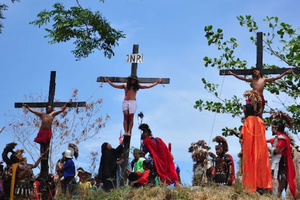St. Thomas Aquinas and Mary’s Immaculate Conception
Mary was saved in a more profound way than others who are in the company of the elect.

I will dare to disagree with and respectfully critique the great St. Thomas Aquinas in this article. I’m not a Thomist, but I have the utmost respect for St. Thomas — so much so that one of the books that I edited is The Quotable Summa Theologica. But individuals and theologians can be wrong, according to Catholic teaching — even those as eminent and gifted as St. Thomas Aquinas and St. Augustine.
In one of his early works, St. Thomas commented on Peter Lombard’s Sentences. In his “Response to Quaestincula 1,” he stated that “it should be said that there is no way she could have been sanctified in her parents, nor even in the very act of her conception.” In his “Response to Quaestincula 2,” he continued:
It should be said that the Blessed Virgin’s sanctification could not have occurred in a becoming way before the infusion of her soul, because she was not yet capable of grace, but also not in the very instant of its infusion, such that by grace infused into her at that time she would be preserved from incurring original sin. For Christ was unique in the human race in not needing redemption, for he is our head, but all share in needing to be redeemed through him. Now, this could not be if any other soul were found that had never been infected by the original stain. And therefore this was not granted to the Blessed Virgin or anyone other than Christ.
And in his “Response to Quaestincula 3,” he concluded:
It should be said that the Blessed Virgin was sanctified before her birth from the womb, which can be gathered from the fact that she above all the other saints was most pure from sin … this purity may be found to have existed in some people such that they were cleansed before their birth from the womb—such as John the Baptist … and Jeremiah … one should not doubt that this was bestowed on the Mother of God in a much more excellent way.
First of all, in St. Thomas’ time of very primitive biology, it was not thought that the soul was created at the instant of conception. Thus, the prerequisite knowledge required to believe in Mary’s immaculate conception (i.e., the specific timing of it) was lacking. My question to St. Thomas, were I a pupil in a classroom of his (oh, the glorious thought!), discussing this topic, would be: “On what basis, esteemed master, do you believe that there is ‘no way’ that this could have happened?” What puzzles me is how St. Thomas admits that the time is uncertain, yet rules out even the possibility of it being present from the moment of the existence of her soul (whenever that was deemed to be in that pre-biological time).
Also in the same section, speculating about the relation of Mary’s parents to her sanctification, he writes, “This God could certainly have done, but it would not have been fitting.” No one questions that God could and would have done whatever he chose to do. But then again, I ask, “Why not from conception?” What is St. Thomas’ objection based on? What caused him to reject it seemingly out of hand?
What didn’t seem to occur to him, but did occur shortly afterward to Blessed Duns Scotus, was that the act of God’s sanctification, making Mary immaculate from the beginning of her human existence, was itself a redeeming and saving act (“preredemption,” as it were). But for that, Mary, of course, would have inherited original sin like anyone else. God simply chose to remove it at the very instant that it would have started to exist. Mary had a savior, as we all did. Without his grace, she would have been neither immaculate nor sinless. But she did cooperate with the grace, as we all do, or should.
But St. Thomas goes on to argue that the Blessed Virgin did indeed attain to a state of sublime holiness “above all the other saints.” It happened at some point in her mother’s womb. He cites the analogies of John the Baptist and the prophet Jeremiah (arguments I have used in my own defenses of the Immaculate Conception): who were “cleansed before their birth from the womb.” I submit that we can’t absolutely deny that their purifications occurred at their own conceptions, either. But we know for sure — from inspired revelation — that this happened before they were born. Aquinas concludes that “this was bestowed on the Mother of God in a much more excellent way.”
Mary was simply saved in a deeper and more profound way than others who are in the company of the elect. St. Thomas saw the essence of what the later dogma clarified, but he didn’t quite put it all together in its completeness and glorious “fittingness.” He was a fallible human being. The development of doctrine takes centuries of the Holy Spirit enlightening holy and intellectually brilliant and wise minds. We have the benefit of hindsight. We’re mere “armchair quarterbacks.”
Even Protestants believe the same thing. Lutheran pastor and scholar Jordan Cooper stated in one of his YouTube videos that no one understood certain important aspects of justification until the 16th century. No one (we’re told) “got” this aspect, central to salvation, till Martin Luther came around. If that took 15 centuries, what’s to prevent a full understanding of Mary’s Immaculate Conception from taking 1,200 years? Protestants are the very last people who can rationally complain about doctrines taking a long time to be fully developed and understood.
Once the Church in her magisterium declares and dogmatizes, it’s fascinating to go back and see how closely the holy saints and great and wise theological minds approached the finally formulated dogma.
- Keywords:
- st. thomas aquinas
- immaculate conception

















